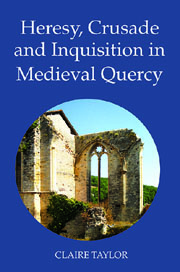Book contents
- Frontmatter
- Contents
- List of illustrations
- Dedication
- Acknowledgements
- Prefatory Note on Words
- List of Abbreviations
- Map 1 Medieval Quercy
- Map 2 Gourdon and its sphere
- The house of Gourdon
- Introduction
- 1 Investigating medieval Quercy: questions about sources
- 2 Medieval Quercy
- 3 War and its aftermath
- 4 ‘Heretical’ Quercy: the evidence gathered by c.1245
- 5 Heresy: a social and cultural life
- 6 Heresy and what it meant
- 7 The reshaping of Quercy
- Conclusion
- Bibliography
- Index
- YORK MEDIEVAL PRESS: PUBLICATIONS
Introduction
Published online by Cambridge University Press: 05 February 2013
- Frontmatter
- Contents
- List of illustrations
- Dedication
- Acknowledgements
- Prefatory Note on Words
- List of Abbreviations
- Map 1 Medieval Quercy
- Map 2 Gourdon and its sphere
- The house of Gourdon
- Introduction
- 1 Investigating medieval Quercy: questions about sources
- 2 Medieval Quercy
- 3 War and its aftermath
- 4 ‘Heretical’ Quercy: the evidence gathered by c.1245
- 5 Heresy: a social and cultural life
- 6 Heresy and what it meant
- 7 The reshaping of Quercy
- Conclusion
- Bibliography
- Index
- YORK MEDIEVAL PRESS: PUBLICATIONS
Summary
Around Easter time in 1242, the deponent Pierre de Penne appeared in front of the Dominican inquisitor Pierre Seilan at his court in Montcuq, in the medieval county of Quercy. What he said, we cannot know exactly. What was recorded, we likewise cannot be sure. But almost certainly his vernacular deposition was translated into Latin and distilled into what we do have, the following summary of his crimes:
Pierre de Penne saw heretics many times in many places, and ate and drank with them often, and sent them bread, fruits, and other things. He believed them to be good people and that they in their sect would be saved. He ate bread blessed by them. He said also that the mercenary Loubaix was as likely to go to heaven as Martin of Tours, and he had said this to the priests who bought wax in honour of St. Martin. He believed that no one could swear an oath or kill without sin. Item, he didn't believe in any of the sacraments of the Church and believed that the heretical church was the only church, that no one in the Roman Church will be saved, but that everyone was saved in the heretical church. Item, he said that God does not destroy what he has made, nor would it disappear. He said also that he adored heretics, and that previously he had denied being put under oath or question. Item, he said that he himself had preached heresies to other people many times.
- Type
- Chapter
- Information
- Heresy, Crusade and Inquisition in Medieval Quercy , pp. 1 - 18Publisher: Boydell & BrewerPrint publication year: 2011



